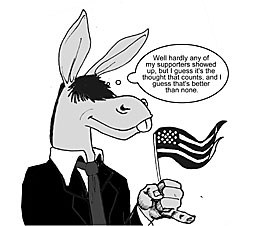
Illustration by Arnie Bermudez
|
|
Arizona Daily Wildcat
Wednesday, November 19, 2003
Print this
What do the next Democratic presidential candidates need to do to win our votes?
Last Sunday night, representatives from five of the nine Democratic presidential candidates converged at Centennial Hall to try to woo the votes of UA constituents. However, the student turnout for the event was remarkably low ÷ only one-half of one percent of the student population showed up at all. Are college students immune to the sweet-talking of practiced politicos, or do they just not care enough to rock the vote? We asked our columnists: What do Democratic candidates have to do to make students care?
 |
|
Jennifer Kursman
columnist
|
|
|
Candidates should deal with student issues
Democratic candidates should hire strippers to dance on their literature tables! No, seriously, students' apathy is appalling when you consider the clout we could have. In the 2000 presidential election, less than half of the 18-24 year-old bloc voted, compared to a 64 percent turnout for citizens 25 years and older. And just a couple weeks ago, ASUA provided free transportation to the polls, but only 15 UA students hopped onto the buses to do their civic duty.
To combat this detachment from politics, presidential candidates should connect their campaign promises to students' lives. Issues like the military's draft, the rising cost of college tuition and the enforcement of underage drinking laws should merit more time during debates. At the same time, students need to do their part ÷ the reason politicians spend so much time talking about Social Security and health care is because older voters have organized effectively: They are making their voices heard.
The success of student-supported candidates can already be seen in Generation Dean, the youth-centered spinoff of Howard Dean's bid for the Democratic nomination. The Internet has played a crucial role in the mobilization of Generation Dean, so politicians should also look for ways to make information readily accessible and convenient to students via the Internet and otherwise.
Don't forget the 2000 presidential election ÷ we all saw just how vital each individual vote is to the final count. Students have the power to make a difference, but not if we stay silent.
Jennifer Kursman is a biochemistry freshman. She can be reached at letters@wildcat.arizona.edu.
Propose larger grants as tuition rises
Democratic presidential hopefuls should talk about improving two things that are relevant to students: increasing the federal student grant amounts relative to rising tuition costs and making the economy rock solid to ensure employment opportunities for all the graduates who are entering the workforce. The latter is certainly not a small chore, and it deserves more attention than this space will allow.
Students with financial need should be eligible for larger grants, like the Pell Grant, in fact, I think Lieberman's idea of increasing the grant by $2,000 sounds about right. Or perhaps there should be grants given to those students who make a commitment to work for the federal government in the technical sciences or any other sector that makes the economy more competitive ÷ like the biotech industry.
Currently, many students who receive the Pell lacks sufficient funds for college expenses and turn to either federal or private student loans. This seems a bit backward because students with serious financial needs should not have to be overburdened with paying off excessive loans ÷ they are already at a financial disadvantage.
Ryan Scalise is a political science senior. He can be reached at letters@wildcat.arizona.eduu.
Want my vote? Come and get it.
Obviously, if presidential candidates want to attract college students, they need to address the issues we care about. But · what do we care about?
Today's college students have a diverse range of concerns. Yes, the funding of education is important · but also important are reproductive issues, gay rights, foreign policy and the economy. We have a stake in the same issues that every other American does ÷ and the same potential to effect change. As recent politics have shown, these issues will only become more pertinent in the future.
And though it's clichˇ, we are the future of this nation. As much as watching presidential debates may detract from precious video game and goofing off time, it's sort of our duty to watch where our country's going. Clearly no one is now.
So if they want students' votes, candidates must come get them. Like any other demographic, college students deserve politicians' time. It's reasonable to demand that more college campuses show up on campaign trails ÷ you know, so that we can actually meet our possible future president rather than listening to a representative.
Of course, in return we need to prove that we aren't the dispassionate nonvoters that candidates seem to write us off as; we need to drag our informed selves to the polls and invest in our nation's future.
All this doesn't mean, though, that Democratic candidates couldn't also provide donkey rides on the Mall. That would win my vote.
Sabrina Noble is an English and creative writing major. She can be reached at letters@wildcat.arizona.edu
 |
|
Daniel Scarpinato
columnist
|
|
|
Don't baby-talk us, we're big kids too
College students are rarely extremely partisan. Our political views are still being formulated. So if presidential candidates want to attract our votes, they should demonstrate that they are excited and involved leaders ÷ not hard-and-fast ideologues.
When senior citizens appear on "The Tonight Show," as Sen. John Kerry did earlier this month, and try to act like 20-year-olds, few votes are won.
Just because we're in college doesn't mean we don't care about politics or important issues. Most of us are taxpaying, involved citizens.
Hot button issues ÷ abortion, war, the economy ÷ are important, but not the sole indicator of a vote. Young people want free thinking, independent-minded leaders who can connect with us, but still maintain a certain level of professionalism.
Under this strategy, Democrats, Republicans and Independents can win over our votes if they try. But since college students don't vote in the large, cohesive block that other groups do, presidential candidates probably won't be pandering to us. Nevertheless, we should still be seen as an interested, mindful demographic, and candidates should actively seek our support.
Unlike the generation before us, we are not jaded by the political scandal of the 1970s, and few of us subscribe to visible demonstrations of political activism.
Instead, we use our ballots as our voices and welcome the opportunity to speak directly with our civic servants.
Daniel Scarpinato is a journalism and political science senior. He can be reached at letters@wildcat.arizona.edu
College students potential votes, not photo op
The most important thing that a presidential candidate needs to do is to treat us college folk like potential votes rather than a photo op. Right now candidates go to college campuses, or at least send their lackeys, for publicity. They don't go for votes.
How to do this is the real puzzler that could be debated for hours. The trick is that college students come from all walks of life and, as a result, every college campus is a melting pot of ideas. Candidates can't pick one issue to campaign on in order to "appeal to younger voters" like they can with other groups of people.
Instead, the best way to get on the colligate bandwagon would be to show the person under the politician ÷ whether it be sitting with the students at a football game, talking to students at lunch or anything to let the students get to know the person, rather than the candidate.
It seems funny to say, but that's really how college-age people think. "He seems like a good guy" or "I think he's a jerk" are a large part of what the average college voter casts his or her ballot for.
Politics aside, the best way to appeal to younger voters is to make them like you; it's as simple as that.
Jason Poreda is a political science and communication senior. He can be reached at letters@wildcat.arizona.edu
Address the issues that students care about
This Sunday, five of the nine Democratic candidates were represented at a forum that was held at Centennial Hall. The turnout was low, which is disappointing since one of these candidates might lead this country and pass laws that affect us all.
The challenge is to attract college students from their busy lives or drag them out of their stupor. The secret is to use issues that are important to us, such as financial aid, the current job market and the war with Iraq, as well as mass advertising to lure us.
Representatives should plan forums with different departments, such as political science. Fliers used in advertising for this event should include details about the candidates being represented and their views on popular issues. They should also include issues the representatives will cover in depth. These fliers should be posted in different buildings and should also be distributed to residence halls so that a large number of students are reached.
At these forums, representatives should emphasize how they will help make students' lives better. They should inform the students about their views and plans regarding issues like financial aid. Only by talking about issues that affect us will they succeed in getting our attention.
Food should be provided at these events; free food always attracts us. Representatives should also talk to more teachers to give extra credit for attending such events.
It is only by reaching out to us that the candidates will increase student interest.
Afshan Patel is a finance junior. She can be reached at letters@wildcat.arizona.edu
